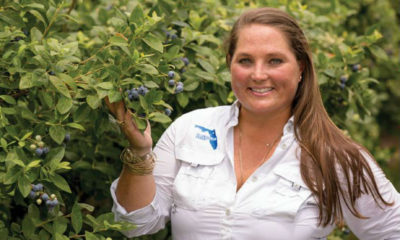Grower 411
July
|
Disease |
The most important method of weed control is preventing current weeds in your field from developing seeds. Some common weed species in blueberry can produce more than 100,000 seeds per plant and can survive in the soil profile for 5 to 15 years. Preemergence herbicides can provide residual weed control for many weeks or months. But the frequent summer rainfall events may move the preemergence herbicide below the area of greatest control. So blueberry growers will rely on postemergence herbicides when they experience a reduction in weed control from preemergence herbicides.
Contact: Brittany H. Lee, President, Florida Blueberry Growers Association, 352-505-8878

Research on Most Effective Way to Keep Your Blueberries Hydrated
Florida blueberry growers produce more berries this year, despite pollination problems, gall midge and Hurricane Irma.
Just a reminder to blueberry growers that it is time to monitor for the presence of adult blueberry gall midge on your farms. Adults are typically active beginning in November, with a peak in January and February in central and south-central Florida, and a peak in February and March in north-central Florida. Emergence is typically triggered by cool days followed by warm days. It is thought that adult males emerge approximately two weeks before the emergence of adult females. Monitoring can be done using either a bucket trap placed on the ground below the plant canopy (3-5 per acre) or a clear sticky panel trap hung in the lower part of the plant canopy (1-3 per acre) (see Oscar Liburd gall midge bulletin attached). Spraying with recommended insecticides should begin when two or more adults are found in a trap.
Positively Affecting the Blueberry Industry with ‘Little Changes’ Campaign
 Q&A with Bill Braswell on Recent Bills Past
Q&A with Bill Braswell on Recent Bills Past
With Jeanette Klopchin, Pollinator Protection Specialist, Division of Agricultural Environmental Services, FDACS
Avoiding Water Stress During the Fruit Development Period
<a href="http://52.23.187.59/wp-content/uploads/2016/07/crop-insurance-graphic-e1468335039586.jpg"><img src="http://52.23.187.59/wp-content/uploads/2016/07/crop-insurance-graphic-e1468335039586.jpg" alt="crop-insurance-graphic" width="575" height="322" class="aligncenter size-full wp-image-2414" /></a>
<a href="http://52.23.187.59/wp-content/uploads/2016/07/farm-management-graphic.jpg"><img src="http://52.23.187.59/wp-content/uploads/2016/07/farm-management-graphic.jpg" alt="farm-management-graphic" width="575" height="322" class="aligncenter size-full wp-image-2425" /></a>
<strong>Highlights and risk management strategies from the 2016 Florida Agriculture Financial Management Conference</strong>
<strong>Last year’s chill hours and tracking temperatures for 2016-17 winter </strong>
WHEN I THINK of the recent challenges growers have faced, I’m reminded of a quote, which I’m sure many of you have heard: “The farmer has to be an optimist or he wouldn’t still be a farmer.” Made memorable by Will Rogers, this quote rings true for today’s growers as much as it did in his era (if not more).
U.S. CONSUMERS prefer Florida blueberries above all others, and a new online survey conducted by the UF/IFAS Center for Public Issues Education (PIE) in Agriculture and Natural Resources proves it. The study, funded by a Specialty Crop Block Grant from the Florida Department of Agriculture and Consumer Services, surveyed consumers in 31 U.S. states about their preference for buying blueberries in the grocery store. The survey showed that consumers preferred blueberries from Florida over berries from any other top 10 blueberry-producing state. However, the valuable information from the survey doesn’t end there. <!--more-->
<strong>Industry can generate more consumer demand for blueberries through agritourism and health benefit awareness, UF report states</strong>